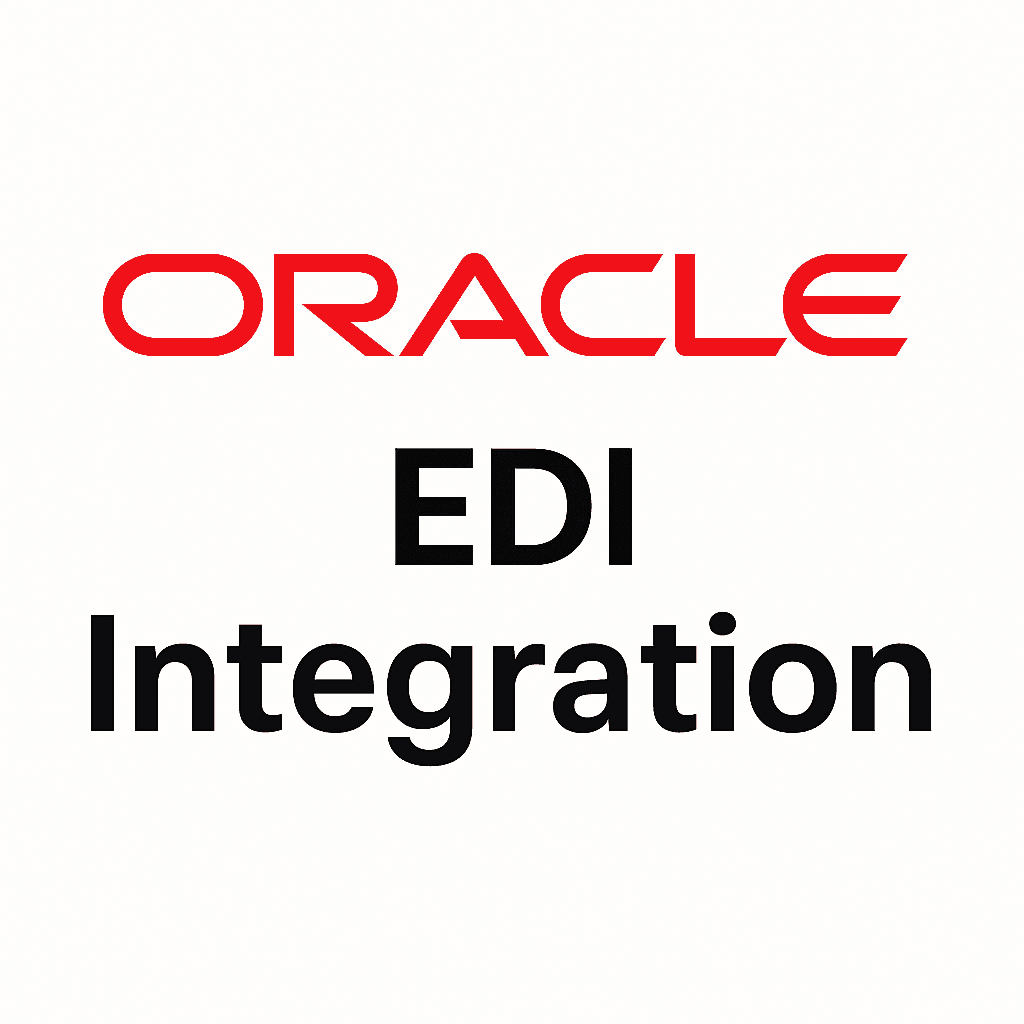Modernize Oracle EDI integration with an API-first platform. Learn how Orderful connects Oracle ERP to trading partners for faster supply chain operations.
Oracle ERP powers finance, supply chain, and operations for some of the largest enterprises in the world. This suite of applications spans Oracle Fusion Cloud, E-Business Suite, and JD Edwards, helping companies manage everything from procurement to fulfillment.
As powerful as they are, when it comes to electronic data interchange (EDI), Oracle systems aren’t built to handle modern trading partner requirements on their own. Suppliers still need reliable ways to send and receive business documents like purchase orders, advance ship notices (ASNs), and invoices that meet retailers' EDI requirements.
A modern Oracle EDI integration helps bridge the gap between your Oracle ERP system and EDI trading partners. The right EDI solution ensures every transaction moves seamlessly between systems, reducing manual processes through automation tasks and improving data accuracy across your supply chain using real-time validation.
Whether you’re upgrading from an in-house setup, moving away from a value-added network (VAN), or modernizing a legacy Oracle integration, this guide will help you explore your options and show you how Orderful simplifies Oracle EDI through an API-first, cloud-native approach.
Oracle EDI Integration Definition:
Oracle EDI integration connects Oracle ERP systems with EDI trading partners to automate document exchange, improve data accuracy, and speed up supply chain communication.
What Is Oracle EDI Integration?
Oracle EDI integration connects your Oracle ERP system with your EDI platform, converting Oracle files into EDI documents that meet the standards your trading partners require. It automates the exchange of business documents such as purchase orders, invoices, and shipping notices between Oracle and external systems in a consistent, standard format.
Several Oracle applications support EDI connectivity, including Oracle E-Business Suite, Oracle Fusion Cloud ERP, and JD Edwards. Each platform manages enterprise data differently, but all share the challenge of translating internal Oracle data structures into EDI formats that trading partners can understand.
A modern integration solution fills that gap by mapping data elements between Oracle and your partners’ systems. It ensures that information such as trading partner codes, item numbers, and shipment details align correctly, maintaining data accuracy across every transaction.
For suppliers working with retailers like Walmart, Target, or Amazon, compliance depends on these integrations running smoothly. Without them, companies face delays, manual rework, and potential chargebacks for noncompliant EDI transactions.
Challenges of Oracle EDI Integration
Integrating EDI with Oracle ERP can be complex, especially for teams that still rely on older tools or manual processes. Because Oracle systems weren’t built with EDI as a core function, many companies face a series of hurdles when trying to connect seamlessly with trading partners.
Complex Mapping and Translation
Every trading partner has unique business rules and document formats. Mapping Oracle’s internal codes and data elements to each partner’s EDI standards requires constant maintenance and custom scripts. A single incorrect field or missing data element can cause transaction failures or time-consuming resubmissions.
Dependence on Legacy VANs or Brokers
Traditional value-added networks (VANs) or brokered EDI services manage data exchange between companies, but they often add cost and delay. Each change request or new partner setup must pass through a third-party provider, creating bottlenecks that slow onboarding and limit visibility.
Lengthy onboarding timelines
Connecting a new partner to Oracle through legacy systems can take weeks or even months. Each partner connection involves manual configuration, testing, and data validation before transactions can go live. This delays revenue and increases the workload for IT teams.
Limited real-time visibility into supply-chain data
Without a unified, cloud-based EDI platform, Oracle users struggle to monitor transaction status across multiple B2B systems. Teams often don't discover errors until after they reach the trading partner, making it harder to ensure data accuracy and operational efficiency.
Together, these challenges drive up cost and complexity, leaving many organizations searching for a more modern approach to Oracle EDI integration.
Oracle EDI Integration Options
Companies running Oracle ERP have several ways to connect EDI transactions with their internal systems. Each approach comes with its own balance of cost, control, and scalability, so it’s important to understand how they differ before choosing a solution.
The table below compares three common approaches to Oracle EDI integration:
Approach | Pros | Cons | Best Fit |
|---|---|---|---|
Custom / In-house | Tailored to Oracle’s data structure and business rules | High development cost, ongoing maintenance, limited scalability | Large enterprises with dedicated IT and EDI teams |
VAN / Broker | Handles partner connections and data exchange | Expensive, slower onboarding, limited visibility into transactions | Traditional setups maintaining legacy infrastructure |
Cloud / API-First (Orderful) | Fast onboarding, scalable architecture, real-time monitoring, improved supply-chain efficiency | Requires change management during migration | Enterprises modernizing Oracle EDI with cloud EDI |
Some Oracle environments include the Oracle EDI Gateway product, which supports file-based data exchange for inbound and outbound transactions. While it can manage basic document translation, it often requires additional middleware or manual processes to meet modern trading-partner standards. Others use Oracle Integration Cloud (OIC) to connect external applications through APIs, though OIC still depends on custom mappings and EDI expertise to ensure data accuracy.
Modern, API-first platforms like Orderful combine the reliability of Oracle ERP with the flexibility of cloud EDI. Instead of maintaining multiple point-to-point connections, Oracle users connect once through a unified API and gain visibility across every transaction and trading-partner relationship.
Key Benefits of Oracle Cloud EDI Integration
Modernizing your Oracle EDI integration with a cloud-based platform delivers measurable improvements across operations, compliance, and partner collaboration. Here are the key advantages you can expect after moving away from legacy systems:
Faster trading-partner onboarding: Cloud EDI platforms streamline testing and setup by replacing custom file exchanges with standardized connections. Companies can connect new partners in days instead of weeks, accelerating time to revenue.
Real-time validation and compliance: Automated checks ensure that all your EDI documents meet requirements before reaching the trading partner. This proactive validation reduces errors and prevents costly penalties.
Improved data accuracy and supply chain efficiency: Centralized integrations give Oracle users end-to-end visibility into transactions. When every document and data element syncs correctly, teams can plan inventory, fulfillment, and logistics with greater precision.
Reduced manual effort and IT overhead: Automated data mapping and conversion minimize manual tasks and repetitive rework. IT teams spend less time troubleshooting individual transactions and more time optimizing overall processes.
Enhanced collaboration with trading partners: A single cloud EDI connection supports real-time communication between Oracle ERP and external systems. Suppliers and retailers stay aligned on orders, shipments, and invoices, helping to maintain strong business relationships.
Together, these benefits give organizations a scalable foundation for long-term growth while keeping Oracle ERP fully aligned with modern EDI standards.
How Orderful Simplifies Oracle EDI Integration
Orderful brings a modern, API-first approach to Oracle EDI integration, eliminating the manual processes and long development cycles associated with traditional solutions. Instead of managing dozens of point-to-point connections, you connect your Oracle ERP once to Orderful’s cloud EDI network and gain real-time visibility across every trading-partner transaction.
One API Connection for All Trading Partners
Orderful centralizes EDI through a single, secure API that connects your Oracle ERP to every retailer, distributor, and logistics partner. Adding new connections takes days instead of months, helping you scale faster as your business grows.
Prebuilt Mappings for Oracle Systems
Orderful offers prebuilt mapping templates and integration services that you can apply to Oracle systems like Fusion or E-Business Suite. This reduces much of the manual coding and middleware effort typically required. With the right setup, you can begin exchanging documents more quickly than with traditional approaches.
Real-Time Dashboards and Proactive Error Handling
Orderful provides instant visibility into outbound and inbound transactions. Built-in validation tools flag missing or incorrect data elements before they reach your trading partner, ensuring clean, compliant EDI documents every time.
Flexible Modernization With Oracle Integration Cloud
If you're already using Oracle Integration Cloud (OIC), Orderful’s API automates transmission through modern communication protocols. It also supports converting application data formats (like JSON) into standard EDI documents, helping reduce manual mapping efforts and middleware overhead.
With a cloud-native design and open architecture, Orderful bridges Oracle ERP systems with today’s digital supply chain requirements, giving you faster onboarding, fewer errors, and greater operational efficiency.
Unlock Modern EDI for Oracle ERP Systems
Oracle ERP remains one of the most powerful platforms for managing enterprise finance, supply chain, and operations. But as trading networks evolve, modern EDI has become essential for keeping data accurate, compliant, and moving to keep up with modern businesses.
Legacy EDI methods often slow down onboarding, require manual monitoring, and make it difficult to scale as your trading capacity expands. Cloud-based platforms like Orderful simplify that complexity with a single API connection, real-time validation, and built-in visibility, allowing your team to focus on future growth instead of troubleshooting today.
If your company is ready to modernize Oracle EDI, Orderful offers a faster and simpler way to connect. You’ll onboard partners in days instead of weeks, improve supply chain efficiency, and maintain full control over every transaction. Contact an EDI expert or book a demo today to modernize your Oracle EDI integration.
About Orderful
Orderful is a modern, API-first EDI platform that helps companies connect once and exchange data instantly with all their trading partners. Built for Oracle ERP and other enterprise systems, Orderful enables faster onboarding, real-time validation, and complete supply chain visibility.
FAQs About Oracle EDI
What is Oracle EDI integration?
Oracle EDI integration connects Oracle ERP systems to EDI trading partners, automating data exchange for purchase orders, invoices, and ASNs.
Which Oracle ERPs support EDI?
Oracle Fusion Cloud, E-Business Suite, and JD Edwards all support EDI integration through APIs or EDI gateways.
How does Orderful integrate with Oracle?
Orderful connects Oracle ERP to its API-first EDI platform, translating Oracle data into standard EDI formats and validating transactions in real time.
What are the benefits of modernizing Oracle EDI?
Modern Oracle EDI integrations enable faster onboarding, fewer manual errors, and real-time visibility across the supply chain.
Why choose Orderful for Oracle EDI?
Orderful simplifies Oracle EDI through a single API connection, prebuilt mappings, and transparent pricing, helping businesses scale efficiently.

